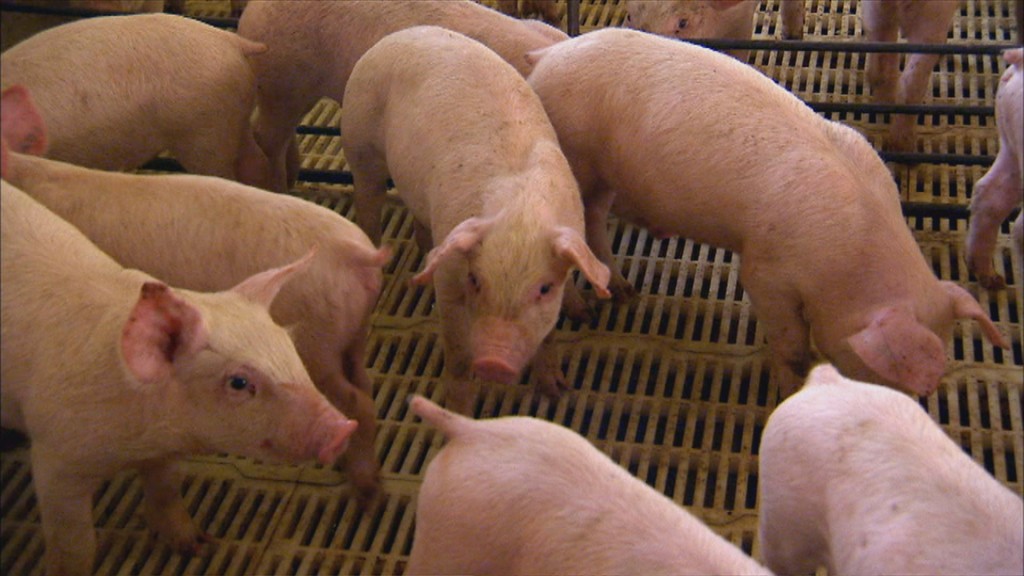How Congress Has Tried to Regulate Antibiotic Use in Animals

October 14, 2014
Share
Even the government agency charged with regulating antibiotic use in animals doesn’t know enough about it.
In its 2012 annual report on sales of antibiotics for use in animals, the Food and Drug Administration noted that given the limitations in data it collects, readers cannot make “assumptions” about how the drugs are actually used — for what purpose, in which animals, and at what doses.
That detailed information does exist. Reuters recently obtained hundreds of records that detail how five major poultry companies administer an array of antibiotics at low levels throughout the birds’ lives. The records, known as feed tickets, list exactly which drugs were given to the animals and at which doses.
But the companies aren’t required to disclose that information — it’s considered confidential. And the FDA, while it has access to the data from individual companies, says it doesn’t have the legal authority to compile or disseminate it.
For more than a decade, some members of Congress have been trying to remedy the problem by proposing legislation that would require further disclosure or otherwise regulate the use of antibiotics in animals. They’ve had almost no success. The few significant pieces of proposed legislation — six bills since 2003 — have withered amid ambivalent support from lawmakers, lobbying by industry groups, and a regulatory agency concerned about overreach.
The FDA tried in the 1970s to impose new restrictions on antibiotic use in animals, but backed down amid threats to cut the agency’s budget. Today, the FDA has taken a more cautious approach, working with drug companies, veterinarians and farmers to voluntarily reduce the use of antibiotics in animals. “We actually believe that by taking a voluntary approach we are going to move towards our goal … in a more effective and speedier way,” Margaret Hamburg, the FDA’s commissioner, told FRONTLINE.
Recent efforts to pass legislation started in 2003, with Rep. Louise Slaughter (D-NY). The only microbiologist in Congress, Slaughter introduced a bill that would have required more detailed reporting on how antibiotics were being used in food animals and also required companies to phase out those drugs over time. She’s proposed it unsuccessfully every session since. “Every two years I have to start over,” she told FRONTLINE. That same year, Sen. Ted Kennedy (D-Mass.) and Rep. Sherrod Brown (D-Ohio) introduced companion bills with similar language to regulate the use of antibiotics, which also failed.
The only successful piece of legislation passed in 2008. Six members of Congress, led by Rep. Frank Pallone, Jr. (D-NJ), amended the appropriations for the FDA to require it to report sales figures on antibiotics used in animals.
Five years later, in 2013, a new wave of legislation was proposed — but all the bills were left to languish. Slaughter and Rep. Henry Waxman (D-Calif.) introduced a bill requiring drug manufacturers and large-scale poultry, swine and livestock producers to report to the FDA on how their drugs were being used in animals. There was also the Preventing Antibiotic Resistance Act, sponsored by Sen. Dianne Feinstein (D-Calif.), and Susan Collins (R-Maine), which required the FDA to publicly release the data it has and consider new sources of data. And Rep. Jim Matheson (R-Utah) introduced a broader bill to address antibiotic resistance, including expanded data collection.
That same year, public health advocates proposed amending the FDA appropriations bill, which was up for renewal, to require the agency to gather and report additional data on antibiotic use in animals.
The proposed changes were opposed by industry groups, who were concerned that the new data would be used to try to restrict antibiotic use in animals. “We did not think they would be helpful,” Liz Wagstrom, chief veterinarian for the National Pork Producers’ Council, told FRONTLINE.
But there was also so little support in Congress, Wagstrom said, that the industry didn’t have to actively lobby against it. The Senate committee charged with appropriations for the FDA, chaired by Sen. Tom Harkin (D-Iowa), and Sen. Lamar Alexander (R-Tenn.), wasn’t able to reach a consensus. A Senate aide, speaking to FRONTLINE on condition of anonymity, said there wasn’t enough time to consider the changes, and the committee didn’t want the main bill to get sidetracked by debate.
The FDA didn’t push for the new authority, either. The agency had already begun considering ways it might collect or share new data on its own, and wanted to see that process through. “I don’t know that Congress is better positioned to ask for and get the data that’s needed,” Hamburg, the FDA’s commissioner, told FRONTLINE. “I think it’s really it’s a question of us all working together to identify what are the critical data needs.”
Ultimately, the FDA appropriations bill passed without the proposed changes. Feinstein, Collins and Sen. Kirsten Gillibrand (D-NY) introduced a separate bill to compel the FDA to develop a more comprehensive data collection plan; it also failed.
The FDA’s funding won’t be up for renewal until 2018. In the meantime, Slaughter is expected to introduce her bill once again during the next session.

Related Documentaries
Latest Documentaries
Related Stories
Related Stories
Explore
Policies
Teacher Center
Funding for FRONTLINE is provided through the support of PBS viewers and by the Corporation for Public Broadcasting, with major support from Ford Foundation. Additional funding is provided the Abrams Foundation, Park Foundation, John D. and Catherine T. MacArthur Foundation, Heising-Simons Foundation, and the FRONTLINE Trust, with major support from Jon and Jo Ann Hagler on behalf of the Jon L. Hagler Foundation, and additional support from Koo and Patricia Yuen. FRONTLINE is a registered trademark of WGBH Educational Foundation. Web Site Copyright ©1995-2025 WGBH Educational Foundation. PBS is a 501(c)(3) not-for-profit organization.




















